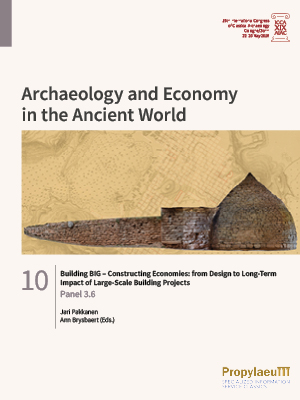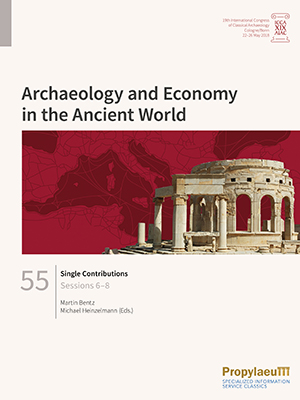Brysbaert, Ann
Building BIG – Constructing Economies: from Design to Long-Term Impact of Large-Scale Building Projects: Panel 3.6
This volume contains various studies that range from prehistoric Greek building programmes to building in the Roman period. The economic growth of modern societies has been closely linked with construction industries: investments, transport infrastructures for materials and labour-intensive building programmes all have a large impact on local, regional and even global economies. The end results have shaped the built environment of our everyday lives and have often led to an increased quality of life and affluence, though there are many cases that did the opposite as well. Large-scale building projects in pre-industrial societies required extensive manual labour to be invested from the moment materials were scouted for, over the extraction, transportation, use and the subsequent maintenance. Since most ancient societies were based on subsistence economies, important decision-making was a daily balancing act between building work and agriculture. These decisions often strongly influenced the patterns of land use and may have also resulted in circular economic strategies. The papers presented in this volume emphasise the importance of the socio-economic and political structures and decision-making that resulted in ‘Building Big’, irrespective of the shape and final size of the projects.
Sessions 6–8, Single Contributions
Economic aspects permeate all areas of public and private life in ancient societies, whether in urban development, religion, art, housing, or in death. Research on ancient economies has long played a significant role in ancient history. Increasingly in the last decades, awareness has grown in archaeology that the material culture of ancient societies offers excellent opportunities for studying the structure, performance, and dynamics of ancient economic systems and economic processes. Therefore, the main objective of this congress was to understand economy as a central element of classical societies and to analyse its interaction with ecological, political, social, religious, and cultural backgrounds. The theme of the congress was addressed to all disciplines that deal with Greco-Roman civilization and their neighbouring cultures from the Aegean Bronze Age to the end of Late Antiquity.
This collective volume contains single contributions from sessions 6, 7 and 8, which discuss questions about consumption and investment in everyday life, sanctuaries and urban contexts, as well as questions about the role of the city in the ancient economy.








